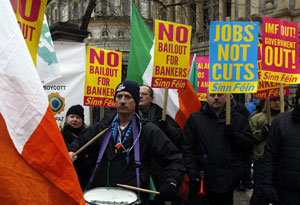Ireland spending cuts unveiled amid bailout
 Siobhan Kennedy
Washington Correspondent
Siobhan Kennedy
Washington Correspondent
Ireland outlines its toughest budget cuts in a generation as the country’s finance minister says it is time to move forward with “confidence and purpose”, writes Siobhan Kennedy.

But Brian Lenihan’s savage cost-cutting measures still hang in the balance and will need the approval of Ireland’s parliament before they can be enshrined in law – and trigger a crucial 85bn euro bailout.
The high-level substance of Mr Lenihan’s budget was known. 15bn euro worth of cuts by 2014, with 6bn euros of those coming next year.
But what we discovered today was more detail on exactly where the pain would fall. Two thirds (about 66 per cent) will comprise spending cuts (in the UK the figure is more like 80 per cent) with the rest coming in the form of tax increases.
But here, Ireland has opted to widen the income tax net rather than raise income tax overall. Now the 45 per cent of Irish people who didn’t pay any income tax will be forced to do so.
There was a sweetener too. The country’s embattled Prime Minister, Brian Cowen, would take a further 14,000 euro cut in his salary this year and all government ministers would take a 10,000 euro hit. The president will also see a cut in salary.
The rest of the squeeze will come in the form of cuts. And there were plenty of them. To child benefit (20 euros a week for a family of two), tax credits, all sorts of tax relief, public sector pensions (cut by 4 per cent annually for earners over 12,000 euros) and unemployment benefits.
The pain was balanced by some stimulus measures – a cut in stamp duty to 1 per cent for all house purchases up to 1m euros, some green incentives and money for work placements for the unemployed – but mostly it was pain.
But it was pain that Mr Lenihan insisted was necessary. “The scale of this adjustment is demanding, but it demonstrates the seriousness of our intent,” Mr Lenihan said.
The first votes on the budget start on Tuesday night and finish on Thursday. Although the leading Fianna Fail party has a razor thin majority, the budget is widely expected to pass. But a likely election in the new year will mean a coalition of the centre-ring Fine Gael and the centre-left Labour party will end up pushing through all the measures.
'The banks are still the key issue'
The Irish economy is nursing a staggering deficit of 32 per cent of GDP, the highest in the Eurozone, brought about by the massive, multibillion bailout of its banks after their decade long property spending spree.
The Irish people rightly feel they are now being made to pay the price for the banks' excesses even though, controversially, the financial institutions that lent Ireland's banks the money (among them, Royal Bank of Scotland and Lloyds) have so far not had to realise any significant losses on their loans. Instead, the Irish government stepped in and now the Irish people will have to suffer the consequences.
The big question is whether or not, despite all the pain now being inflicted, Mr Lenihan and his men have done enough to turn the once blooming nation around. And on that point, the jury, and the financial markets, appear to be out. That's partly because there is still some doubt that the bank bailout – despite an extra 35bn euros from the 85bn European and IMF bailout package – will be enough. If losses continue to mount, it's not unfeasible that the banks will need more.
One economist in Dublin told Channel 4 News tonight. "The banks are still the key issue. Not so much the capital, they have an extra 35bn, but their liquidity. They have a huge amount of deposits, but if those depositors lose confidence, the banks would still be in a lot of difficulty".
And then there's the bigger question of economic growth. Will the country be able to recover quickly enough to pick up the slack and get Ireland back on its feet again? Mr Lenihan thinks so. He told Parliament today that Ireland had a highly skilled workforce and that his measures today – including the freezing of corporate tax at the relatively low level of 12.5 per cent – would "benefit domestic sectors".
He'd better hope they do. The worry is that as his vicious cost-cutting measures start to kick in they will have the opposite effect, dampening consumer spending, increasing unemployment and slowing economic growth.